It’s time for another edition of Australian cultural lessons! I’ve picked up lots of quirky, hilarious, confusing and new vocab, pronunciation, and how-tos. And had cause to hark back to my novice New Zealand days…
Things that contribute to the rest of the world mixing up NZ and Australia or thinking that they are the same place/country? Both:
-
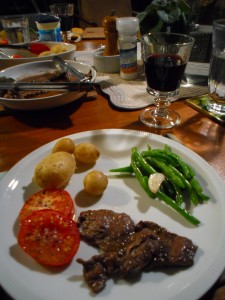
“An Evening Tea” – Kangaroo steak, garden beans and slow-roasted tomatoes, local dutch cream potatoes, local wine = happy, happy Jema.
Eat Tea – At certain times of the day, it becomes unclear whether I am being offered a hot drink or a meal. Evening and sometimes even the midday meals are colloquially called “tea.” As in “Shall we have spaghetti for tea tonight?” Or “Would you like to have tea (lunch) before we go to the beach?”
- Have Meaty Games of Chance — I laughed out loud when the bartender made a last-call announcement at the Prince of Wales Hotel (hotel can mean both hotel and/or pub in both countries, too). Not last-call for drinks, but last-call to get in on the meat raffle. Can you imagine going out for drinks after work and coming home with a couple of raw T-Bones or a package of sausage?
- Never Get Off – the term used to describe the cessation of work in both places is “finish.” No one would ask you what time you “get off” work on Friday. It would always be “What time are you going to finish?”
- Flush Conservatively — rather than the two or three gallons it takes to clear out the traditional American loo, here all toilets are equipped with a half flush.
- Give the John it’s Own Room — ask to use the bathroom in most Aussie or NZ homes, and there’s every chance you’ll be pointed a room conspicuously missing a toilet. For the most part this is grand — no waiting for bladder relief while someone showers. But it’s strange to have to leave the loo and go to another room for hand-washing.
- Talk Unabashedly About “the Toilet” – even at a fancy-pants restaurant, it wouldn’t be impolite to ask, “Excuse me, where is the toilet?”
-
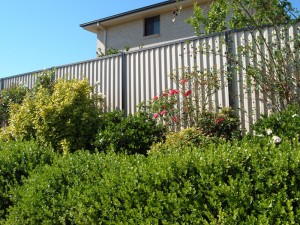
I feel a bit cheeky nicking a photo from a site selling this stuff as a great solution just to illustrate how ugly I think it is. Hope karma gives me a break on this one!
Mark Boundaries with Metal — I guess most backyard fences in America aren’t all that attractive when I think about it. However, I find the sheet metal fences here particularly unattractive. I haven’t confirmed my theory with anyone, but it seems termite presence is likely responsible for the material, and the infamous heat is responsible for the color — almost always a light shade of tan or cream.
- Sing on Sundays — A pub tradition in both places, known as “Sunday Afternoon Sessions,” is essentially a chilled out, afternoon, weekend concert.
- Eat Tasty Cheese — in America, it’s called “sharp” or “aged” cheddar. On the bottom side of the globe, English speaking folk get straight to the point.
Along the same lines, many things here have rather uncreative, and yet memorable, names. Like:
-
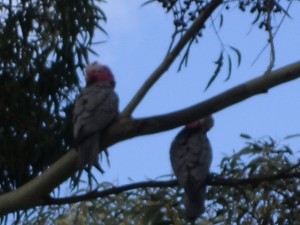
These guys were just hanging out in the front yard. Pink & Greys, in case my zoom-work has obscured that usually obvious bit.
“Willy Willy” – a dust devil or mini-tornado.
- “Willy Wag Tails” – an adorable black and white-breasted bird that can’t help but shake it’s booty.
- “Pink and Greys” – large parrots that are… ummm… Pink. And grey.
- “Reject Shop” – a store full of cheap stuff — kind of a cross between Ross and a dollar store.
- “Pot Plant” – generally not a marijuana specimen, but a plant growing inside a pot.
- “Little Blue Boys” – small, bright blue birds of a species where females are brown and white and males are… indigo?
- “Chin Wag” – a casual chat
More quirky vocab:
- “number plates” – license plates on cars. Said, of course, “numbah.”
- “moreish” – not having to do with the English Moors. Applauds delightful flavor in food. After tasting the chocolate mousse, one might say, “Wow, that’s more-ish!”
- “letter box” – a mail box
- “nappie bag” – a diaper bag
- “fringe” – bangs. Strange how the American word is plural. You could say either, “I’m going to cut my bangs,” or “I’m going to cut my fringe.”
- “fortnight” – two weeks — a handy term I wish we used in the U.S. Ex: “We get paid every fortnight.” Or, “Aunt Maggie will be here in a fortnight.”
- “ring” – a verb meaning call (on the telephone). “I’ll ring before I come by.” “Tell Sarah to ring me on Saturday, please.”
-

A cooler, by any other name, would be an Esky. (Or a “chilly bin” in NZ. See? Some things are different!)
“esky” – a cooler that one might fill with ice and take to the beach or camping.
- “stickybeak” – generally means having an exploratory look around. Can also refer to a busybody who sticks their beak into things. Ex: (said to me by a guy I was going to housesit for) “Come around on Saturday for a bit of a stickybeak.”
- “ta” – thank you — said to a bartender for bringing you a beer or a dining companion for passing the salt. Not appropriate to express appreciation for a gift or for use in formal company.
- “mate” – no cultural equivalent exists. It’s sort of like “dude,” but used more widely and across more class divisions. When men say it to men, I don’t bat an eye. However, it sounds strange to hear a 40 year-old woman say it to a 10 year-old boy, or owners say it to dogs, or wives say it to husbands, or men say it to me or other women.
- “haych” – the letter H. While U.S. folks would pronounce H.R. (as in Human Resources) “aych are”, here it sounds more like “haych har”
- “chuffed” – happy!
- “not fussed” – kind of like saying “Not really, but I don’t care.” A reply to, “Shall we get the peanut butter ice cream again?” might be, “Oh, I’m not fussed about it.”
Along the same line as vocab — I’m slowly starting to wrap my tongue around the plethora of Aboriginal place names. Many, many, many town names end in “up”: heresay claims it’s the aboriginal word for “meeting place.” Within 20 miles of the farm gate, we have Burekup, Dardanup, Boyanup, and Gelorup. I’ve been to lots of social events at a house in Dalyellup. The sheep shearing show Jenny took me to was in Yallingup. Aside from the “up” suffix, there are lots of double vowels in other aboriginal words. And of course many of the words are a result of misunderstandings. The largest tree in Australia, on par with the Redwoods and Giant Sequoias, is called a “Tingle.” Not the sensation you get being around such an impressive living thing, but because settlers misunderstood the aboriginal “dingle dingle” – roughly translated as the “Be Careful Forest.” (The trees are full of widow-maker branches, and the forest itself doesn’t have many food plants.) I’m just at the tip of the iceberg in the native language department, that’s for sure.
It’s also interesting to note how different Australian English is across generations and class levels. The younger generation here tends to employ a type of inflection which causes many of their sentences to sound like questions. I lost IQ points trying to find a Youtube video to demonstrate this. Here’s the closest I could get – (or watch below?). Outside of inflection, the Australian pronunciation seems to be more emphatic in younger generations. The older people are or the more professional/well-educated they are, the less “Australian” they sound.
Australians are also very casual with their speech. Sometimes there are so many slang terms employed in one sentence that I feel like I’m listening to cockney rhyming slang. Also, I’m always proud of myself when I manage to spot an abbreviated word in a spoken sentence. The towns of Freemantle, Subiac, Busselton, and Dunsburough are frequently shortened to Freeo, Subi, Busso, and Dunno. Elizabeth and Sharon are shortened to Lizza and Shazza. Reticulation (their fancy-pants word for automatic watering systems) is often “retic.” And of course you probably know that the place where you throw another shrimp isn’t a barbecue, but a “barbie.”
Other cultural differences:
-
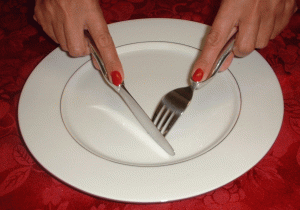
Ironically, this photo is from an American’s etiquette blog about how to properly hold a knife and fork. I guess that solves the final question of this entry!
Monday Funday: Aussies often reference days of the week the way Californians refer to their highways. “I’ll go to Perth on the Wednesday.” “We’ll pick up Jim on the Friday.”
- Personal Touch: ads for jobs, bank loan signage, and most services that might require a customer to call a number list both the number and a name. Imagine the ad for a loan at your bank branch saying “Call Dave at xxx-xxx-xxxx.” Or a credit card offer in the mail encouraging you to follow up by calling “Tracy.” Weird!
- Smoochfest!: Aussies have adopted the single-cheek greeting kiss. I awkwardly dodge it sometimes, and when I try to participate things often get even more awkward… in a face-smash-oops-wrong-side-I-don’t-really-even-know-you kind of way.
- Fork it over: You know how classless Americans like me basically eat with just a fork? You know how more esteemed Americans add a knife to their repertoire, but set it down before every bite? Well Australians tend to eat knife in right hand, fork in left in stabbing position. And they seem to enjoy loading up each bite with a little bit of everything on the plate. Is it sophisticated or just different?
Speaking of food — I’m hungry and that’s enough for now! ♣
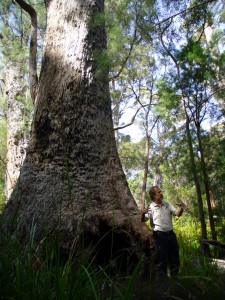




As someone who has lived in both the UK and Australia, I can say that many of these terms are actually used in both British and Australian English – it is the American English that we find odd.
You’re are one of those anti ego. Blaming Americans again. Wow oh wow
Hey Jema! I’ve been reading all your Thailand/Indonesia entries on the lead-up to my trip in July and I’m really enjoying them so THANK-YOU! 😀
I enjoyed this entry though, being an Australian :p. I didn’t realise some of these weren’t widely used. Fortnight? Really? xD. The pink and greys you were referring to are called “Galahs” (pronounced like Ga-lar I guess). I actually have one for a pet, named Chester :p They’re crazy birds, really fun to sit and watch. It’s also one of the more commonly thought of Australian slang words for someone who likes to carry on a lot (which makes sense if you watch them screeching and hanging upside down from branches and such xD). And the inflection thing, that was a nice way to put it. We usually just call them Bogans and they can usually be found drinking goon (cheapest and most vile alcohol available) outside the nearest Centrelink (welfare office) :p. Though in my opinion it’s more socioeconomic than generational (I’d like to think so, belonging to Gen Y). Whenever I’ve heard someone use “shazza” it’s usually someone “taking the piss”, in my group of friends anyway :p.
Hey Ally! Thanks for weighing in! How cool that you have a “Pink and Grey!” Have an awesome time in Thailand/Indo! (haha… Indo… picked that up here for sure!)